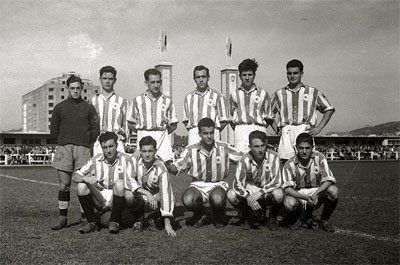Real Sociedad de Fútbol

|
| Team picture from 1952.Team picture from 1952. |
Real Sociedad — History, Basque Identity & Football Legacy
Foundation — The Birth of Basque Football (1909)
Real Sociedad was officially founded on 7 September 1909 in San Sebastián. Its origins lie in local enthusiasm for the sport, British influence, and the Basque region’s early adoption of football. The club quickly developed into one of Spain’s first well-organized teams, participating in the Copa del Rey and laying the foundations of Basque football culture.
The Royal Honor — “Real Sociedad”
In 1910, King Alfonso XIII granted the club the royal title “Real” (Royal), allowing it to adopt the crown in its crest. This early recognition elevated the club’s status and marked the beginning of its deep pride and tradition.
Early National Success & Competitive Rise (1910–1930)
During Spain’s formative football years, Real Sociedad became one of the strongest competitors in the Copa del Rey. Their disciplined style, robust Basque identity, and tactical intelligence allowed them to challenge the country’s elite teams consistently. By the 1920s, La Real had established itself as a respected and admired national contender.
Atotxa Stadium — The Emotional Fortress (1913–1993)
For 80 years, Real Sociedad played at the iconic Estadio de Atotxa, one of Spain’s most atmospheric and intimidating stadiums. It was known for its closeness to the pitch, intense fan presence, and historic derbies. Atotxa is remembered as the true spiritual home of La Real — where generations of supporters lived unforgettable moments.
Golden Era — Back-to-Back La Liga Champions (1980 & 1981)
Real Sociedad reached the peak of Spanish football at the start of the 1980s. Led by legends like Arconada, López Ufarte, Zamora, the club won two consecutive La Liga titles in 1980–81 and 1981–82. This historic achievement defined the club’s identity as a disciplined, intelligent, and competitive team capable of challenging the giants of Spanish football.
Cup Triumphs & Key Achievements
Real Sociedad has also enjoyed significant cup success,
including Copa del Rey victories in:
• 1909 (as Vasconia)
• 1987
• 2020 (final played in 2021 due to COVID)
The 2020 final, a historic Basque Derby vs Athletic Bilbao, was an emotional moment for the region, uniting an entire generation of Real Sociedad supporters.
Anoeta to Reale Arena — A Modern Home (1993–Present)
In 1993, La Real moved from Atotxa to the Anoeta Stadium, later transformed into the modern Reale Arena. With complete reconstruction, the stadium became one of Spain’s most beautiful grounds — close seating, electric atmosphere, and world-class design. It represents the club’s ambition and long-term growth.
Zubieta — One of Spain’s Greatest Football Academies
Real Sociedad’s academy, Zubieta, is world-renowned for producing technical, intelligent, and tactically outstanding players. La Real’s commitment to youth development is central to its identity.
Famous academy graduates include:
• Xabi Alonso
• Antoine Griezmann
• Mikel Oyarzabal
• Asier Illarramendi
• Joséba Etxeberria
• Martín Zubimendi
• Take Kubo (modern icon — not academy)
Zubieta remains a symbol of integrity, identity, and football excellence in the Basque region.
Modern Revival — Attractive Football & European Ambition
Under managers like Imanol Alguacil, Real Sociedad developed a modern, exciting style of play based on possession, pressing, and youth integration. The club consistently competes in European competitions and has become one of La Liga’s most respected modern teams.
With stars like Oyarzabal, Merino, Zubimendi, Kubo, La Real continues to grow with a clear identity and long-term vision.
Real Sociedad Identity — Loyalty, Culture & Basque Pride
Real Sociedad stands for:
• community and identity
• disciplined football style
• youth development
• cultural integrity
• respect and professionalism
The club’s heart lies not only in trophies but in values: loyalty, unity, and Basque pride.

The Real Sociedad crest features the royal crown, the Basque flag colors, and the traditional blue-and-white striped ball — symbolizing heritage, nobility, and football elegance.
